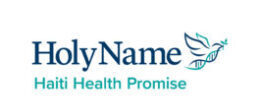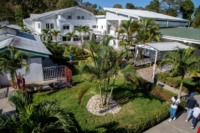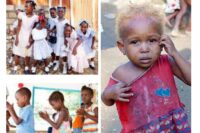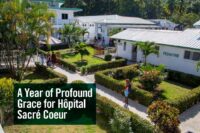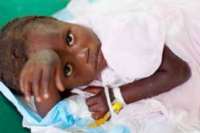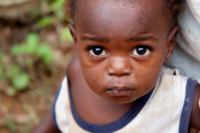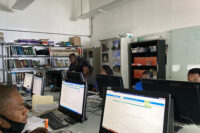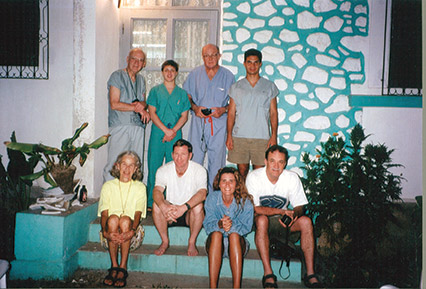
Bill (top far left) and Keena (seated bottom row far left) in front of the Doctors’ Residence
The year I finished college, the last of eight siblings, my father, an obstetrician retired. He had finished his parental duties and he and my mother decided to spend their time as medical volunteers. When they discovered Hôpital Sacré Coeur in Milot Haiti they found their home. I visited them some time ago and I was astonished at the life they created and the happiness they found in this small village. That love for the hospital and the people they met brought them back many times and left a lasting effect on our family.
Bill and Keena McGuinness
I watched the children pour into the Nutrition Center of Haiti’s Hôpital Sacré Coeur the minute it opened. It was a parade of bare feet, runny noses and the telltale tint of orange hair signaling malnutrition. Some were so sick they limped or arrived piggyback on their older brothers or sisters. These kids patiently and stoically waited at the long wooden tables for one of two meals they’d receive that day. Surprisingly, one day a 78-year-old American doctor walked into the clinic, thrust a scrawny arm in the air, and on cue the children leapt up and shouted “Ungawa — Black Power.” Suddenly they were laughing and giddy. They might not have known what they were saying, they spoke Creole, but it didn’t matter they were having fun. That in itself was astonishing. But more astonishing was that the irreverent old doctor who had these kids howling this un-P.C. cheer was my father.
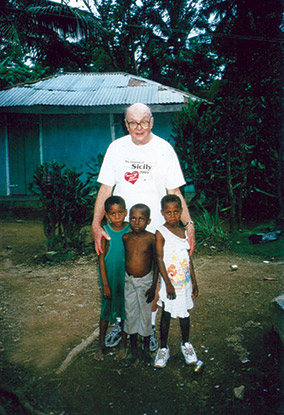
Bill McGuinness and his pals.
We often wondered how these two 78 year olds did it when they couldn’t figure out how to leave a message on an answering machine. We had countless recordings of them.
Mom: “Bill, it beeped leave the message.” Dad: “I didn’t hear the beep.” Mom: “I think it beeped.”
Dad: “Are you sure it beeped.”
Mom: “I’m not positive. You better call back just in case.” My seven siblings and I marveled that they went places where most of us would never venture, places without roads, water or electricity not to mention unstable governments, military coups and armed rebellions.
My mother became a central figure in Milot. Everyone seemed to know her from tiny bare bottomed children who ran out to the road calling her name, “Keena, Keena!” to women who sat on porches shouting and waving to her. She knew them all, talked with them and was involved with their daily lives. In the nutrition center where she volunteered, she was adored, nourishing these children not just with food, but also with love. She sang with them, clapped hands, wiped noses and gave out endless hugs. One day when a particularly sick, emaciated child lay on the concrete floor crying, too sick to sit up and eat; my mother went to him, picked him up and rocked him and immediately he stopped crying. The children at the nutrition center didn’t care that my mother could not open an email attachment. Here she was a natural.
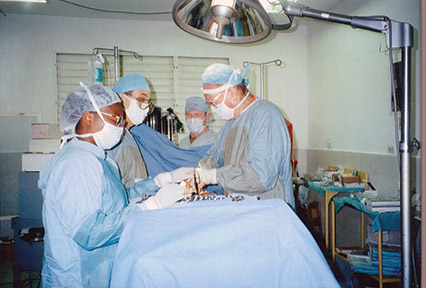
Dr. Bill McGuinness operating at Hôpital Sacré Coeur in 1991
My father was a more commanding figure around the village. The people seem to recognize that he was there for a specific purpose and they gave him more space to do what he was there to do. His operations were booked months in advance by the local doctors who in anticipation of his arrival, scheduled back-to-back surgeries until his departure. Yet, this was when the man was happiest. The pleasure he got from practicing medicine in its purest form gave him an incredible sense of accomplishment.
And although there is not always a happy ending, the seriousness of what he did didn’t make him dour. He loved to play pranks — especially on nuns (probably residual effects from his Catholic School upbringing). One day he tinkered with the Honor Bar Sign-Out Chart in the doctor’s quarters and entered Sister Marie’s name for more than just a respectable glass of Sherry. To the amusement of all (including Sister) she was now signed out for a liter of scotch, 2 bottles of gin, a bottle of Haitian Rum and a six pack of beer. In a place like Haiti smiles and silliness are at a premium.
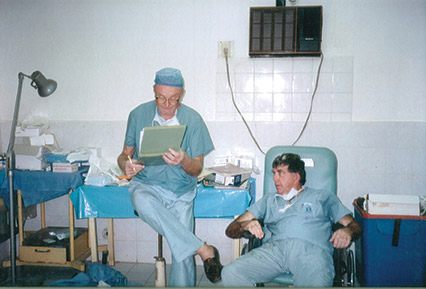 When they returned home from Haiti they often seemed despondent and bewildered. My siblings and I would joke that they had PTSD. And it was true, my competent, smart parents suddenly seemed to revert to senior citizens, befuddled and intimidated by daily life. My mother, who deftly spooned food into starving childrens’ mouths, was paralyzed with indecision over how much salad to make for a family dinner. My father, who performed surgery in a hospital where sometimes the generator went out, refused to use the ATM machine. Although life in Haiti held infinitely more hardship and sadness than life at “home” they spoke of their time there and the friends they made: Dr. Butler, Dr. Dubuque, Dr. Kelly, Dr. Prévil and Fifi the cook with wistful memories. As one sibling put it, “They thrived on the camp type atmosphere.” The communal environment and comradery seemed to create a closeness and warmth akin to family, and they seemed to prefer the simplicity of life to what began to seem to them like the excess of life in America.
When they returned home from Haiti they often seemed despondent and bewildered. My siblings and I would joke that they had PTSD. And it was true, my competent, smart parents suddenly seemed to revert to senior citizens, befuddled and intimidated by daily life. My mother, who deftly spooned food into starving childrens’ mouths, was paralyzed with indecision over how much salad to make for a family dinner. My father, who performed surgery in a hospital where sometimes the generator went out, refused to use the ATM machine. Although life in Haiti held infinitely more hardship and sadness than life at “home” they spoke of their time there and the friends they made: Dr. Butler, Dr. Dubuque, Dr. Kelly, Dr. Prévil and Fifi the cook with wistful memories. As one sibling put it, “They thrived on the camp type atmosphere.” The communal environment and comradery seemed to create a closeness and warmth akin to family, and they seemed to prefer the simplicity of life to what began to seem to them like the excess of life in America.
The CRUDEM Foundation gave them purpose. It kept them vital, energized and engaged and they were a central part of life there. I was astounded by how it had grown and the improvements that had been made. It had expanded and transformed from a rural 20 bed hospital to the heart of a busy community bustling with doctors, volunteers and local townspeople working together to help, heal and improve lives.
I know my parents would be thrilled by how the hospital has grown and the happiness they found at Hôpital Sacré Coeur has been a significant inspiration to my siblings and myself.
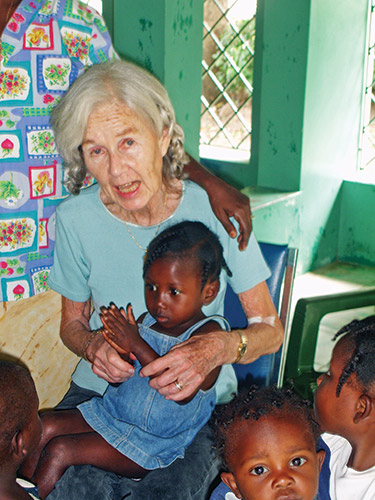
Keena McGuinness in the old nutrition center—her home away from home!
Not long after this article was written, we learned, with deep sadness, of the passing of Keena McGuinness on May 4, 2015. All of us involved with The CRUDEM Foundation and Hôpital Sacré Coeur express our sympathy to the McGuinness family: Maureen, William, Hallie, Gerogeann, Peggy, Brian, Matthew, and Martha. Please know that your parents will have a treasured place in the history of CRUDEM forever — a hospital and a community they helped build. To this day, they are lovingly remembered for their compassion, graciousness, gaiety and resilient spirit. They made hundreds of lives so much better and saved more than we can count.
If you feel inclined to make a donation in Keena’s memory, we encourage you to do so. Thank you.
